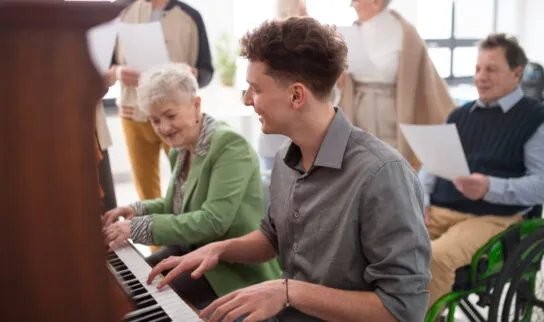Assisted Living
Assisted living provides a residential care option for aging loved ones who require assistance with their activities of daily living (ADLs) but do not necessitate round-the-clock medical supervision.
What is Assisted Living and What Does it Mean for Seniors?
Assisted living is a type of long-term care that provides support and assistance to seniors who need help with activities of daily living (ADLs) but do not require the 24-hour medical supervision of a nursing home. Assisted living facilities typically offer a combination of housing, personal care, and health services in a community-based setting.

In assisted living, seniors can receive assistance with tasks such:
- Bathing
- Dressing
- Grooming
- Medication management
- Transportation
They may also have access to on-site healthcare services, such as medical monitoring and therapy. Additionally, assisted living communities often provide social and recreational activities to help residents stay active and engaged.
Assisted living is designed to provide seniors with a comfortable and supportive living environment that allows them to maintain their independence while receiving the assistance they need. This type of care is often considered a middle ground between independent living and nursing home care and can be an excellent option for seniors who require more assistance than they can receive at home but do not need the level of medical care provided by a nursing home.
Overall, assisted living can provide seniors with a sense of community, companionship, and security while also ensuring that their daily needs are met.

Finding the best senior living is complicated. We've made it easier with our free Care Assessment Tool. Try it.
Finding the right community for seniors as they age is crucial for their overall well-being and quality of life. As people age, their needs change, and they may require more assistance with daily activities (ADLs)or medical care. Finding the right living arrangement can help seniors stay independent, healthy, and happy while ensuring their safety and security.
Here are some reasons why finding the right living arrangement is essential for seniors as they age:
- Quality of Life
- Living arrangements that are suited to seniors’ needs can improve their quality of life, as they can receive the necessary support to continue enjoying their interests and activities
- Safety and Security
- The right senior living community can provide residents with a safe and secure environment that meets their unique needs and minimizes the risk of accidents or injuries.
- Social Interaction
- Senior living communities that provide opportunities for social interaction can help seniors avoid isolation and loneliness, leading to better mental and physical health outcomes.
- Healthcare Access
- Access to healthcare services and support can be critical for seniors, and finding the right senior living community can ensure that they have access to medical care, therapy, and other health services when needed.
- Peace of Mind
- Finally, finding the right senior living facility can provide peace of mind for both seniors and their families, knowing that they are receiving the care and support they need.
Seniors and their families should explore all available options, such as assisted living, memory care, nursing homes, or in-home care, to find the best fit for their unique needs and preferences.
Assisted living is a type of senior living community that provides a combination of housing, personal care, and healthcare services to seniors who need assistance with activities of daily living (ADLs) but do not require the 24-hour medical supervision of a nursing home.
Assisted living facilities typically offer private apartments or rooms for residents, along with communal areas for dining, socializing, and recreation. Residents receive assistance with tasks such as bathing, dressing, grooming, medication management, and transportation. They may also have access to on-site healthcare services, such as medical monitoring and therapy.
Assisted living differs from other types of senior living facilities, such as independent living and nursing homes, in several ways:
- Independence:
- Assisted living provides a higher level of support than independent living, but residents still maintain a significant degree of independence, as they have their own private living space and can participate in activities and outings of their choosing.
- Healthcare Services:
- Assisted living provides access to healthcare services, but not to the extent provided by a nursing home, which offers 24-hour medical supervision.
- Cost:
- Assisted living is generally less expensive than nursing home care but more expensive than independent living.
- Staffing:
- Assisted living facilities have trained staff available 24/7 to provide assistance with ADLs and other needs, but generally do not have the same staffing levels as nursing homes.
Overall, assisted living is an excellent option for seniors who require assistance with daily tasks but still want to maintain their independence and privacy. It is also a middle ground between independent living and nursing home care, providing seniors with the right level of support and care for their unique needs.
Choosing an assisted living community can offer many benefits for seniors, including
- Personalized care and attention:
- Assisted living communities provide individualized care plans tailored to meet the specific needs and preferences of each resident. Staff members work closely with residents and their families to understand their unique needs and develop a care plan that supports their overall health and well-being.
- Assistance with activities of daily living:
- Assisted living facilities offer assistance with activities of daily living (ADLs), such as bathing, dressing, grooming, and medication management. Staff members are trained to provide this assistance in a respectful and supportive manner that promotes independence and dignity.
- Social activities and events:
- Assisted living communities offer a variety of social activities and events designed to promote socialization and engagement among residents. These activities may include exercise classes, game nights, arts and crafts, and outings to local attractions. Socialization is essential for maintaining mental and emotional well-being in seniors.
- Safe and secure environment:
- Assisted living properties prioritize the safety and security of residents, with features such as secure entrances, emergency call systems, and staff available 24/7 to respond to emergencies. This can provide peace of mind to both residents and their families.
- Access to healthcare services:
- Many assisted living communities offer on-site healthcare services, including medical monitoring, medication management, therapy, and wellness programs. This can help residents to manage their health needs more effectively and avoid the need for hospitalization or other more intensive forms of care.
- Maintenance-free living:
- Assisted living properties handle housekeeping services, such as cleaning, laundry, and linen service, as well as maintenance tasks, such as repairs and upkeep of the community’s common areas and grounds. This can relieve seniors of the burden of household tasks and allow them to focus on enjoying their time in the community.
Overall, choosing an assisted living community can offer many benefits for seniors, including personalized care and attention, assistance with activities of daily living, social activities and events, a safe and secure environment, access to healthcare services, and maintenance-free living. By providing a supportive and engaging environment, assisted living communities enable seniors to live as independently and comfortably as possible.
Assisted living communities may offer a variety of specialized services and amenities to meet the unique needs of their residents. Some of these may include:
- Memory care:
- Some assisted living communities offer specialized memory care programs for residents with dementia or Alzheimer’s disease. These programs typically provide a safe and secure environment with trained staff members who specialize in memory care, as well as activities and therapies designed to promote cognitive function and overall well-being.
- Therapy programs:
- Assisted living facilities may offer a range of therapy programs, such as physical therapy, occupational therapy, and speech therapy, to help residents recover from injuries or illnesses and improve their overall health and mobility.
- Onsite medical services:
- Some assisted living communities have onsite medical services, such as a nurse or doctor who visits regularly, to provide basic healthcare services and monitor residents’ health needs. This can help to minimize the need for outside medical appointments and hospitalizations.
- Hospice care:
- Some assisted living properties offer hospice care for residents who have terminal illnesses and require end-of-life care. Hospice care typically provides a range of services, including pain management, emotional support, and spiritual care, to ensure that residents are comfortable and supported during their final days.
- Pet therapy:
- Some assisted living communities may offer pet therapy programs, which involve bringing in trained animals to interact with residents. This can provide emotional support and companionship for seniors and has been shown to have a range of benefits, including reducing stress and improving overall well-being.
Overall, assisted living communities may offer a variety of specialized services and amenities to meet the unique needs of their residents, such as memory care, therapy programs, onsite medical services, hospice care, and pet therapy. These services and amenities can enhance the quality of life for seniors and help them to maintain their independence and dignity as they age.
Choosing the right senior living community for a loved one can be a difficult decision. There are many factors to consider when determining whether an assisted living property is the right choice. Here are some guidelines to help you make an informed decision:
- Consider the level of care needed:
- Assisted living communities are designed for seniors who need help with activities of daily living (ADLs), such as bathing, dressing, grooming, and medication management. If your loved one requires more intensive medical care or supervision, a nursing home may be a better option.
- Evaluate the community’s amenities and services:
- Look for an assisted living facility that offers the amenities and services that are important to your loved one, such as social activities, transportation, dining options, and housekeeping services. Consider whether the community offers any specialized programs, such as memory care or therapy services, that may be relevant to your loved one’s needs.
- Check the community’s safety and security measures:
- Make sure the assisted living `property has adequate safety and security measures in place, such as emergency call systems, secure entrances and exits, and trained staff members who can respond to emergencies.
- Visit the community in person:
- Schedule a visit to the assisted living community to get a sense of the overall atmosphere and to meet with staff members and current residents. Pay attention to the cleanliness of the facility, the quality of the food and accommodations, and the demeanor of the staff.
- Consider the cost:
- Assisted living can be expensive, so it’s important to consider the cost and whether it fits within your loved one’s budget. Look for communities that offer transparent pricing and clear information about what is included in the cost.
- Involve your loved one in the decision-making process:
- It’s important to involve your loved one in the decision-making process as much as possible and to respect their wishes and preferences. Talk to your loved one about their concerns and desires for their living situation, and try to find a community that meets their needs and expectations.
By considering these factors and involving your loved one in the decision-making process, you can make an informed decision about whether an assisted living community is the right living arrangement for your loved one.
Assisted living communities can be a great option for many seniors who need help with daily activities but still want to maintain their independence and privacy. However, there are some types of seniors who may not benefit from an assisted living community or who may need more specialized care. Here are some examples:
Seniors who may benefit from an assisted living community:
- Seniors who need help with activities of daily living (ADL’s), such as bathing, dressing, grooming, and medication management
- Seniors who may feel isolated or lonely living alone
- Seniors who want to participate in social activities and events
- Seniors who want access to amenities and services such as transportation, housekeeping, and dining options
- Seniors who want to live in a safe and secure environment with staff available to assist them if needed
Seniors who may not benefit from an assisted living community:
- Seniors who require 24-hour medical supervision or intensive medical care
- Seniors who have complex medical needs that cannot be met by the staff at an assisted living community
- Seniors who have severe cognitive or behavioral issues that may require specialized care or supervision
- Seniors who prefer to live independently and do not want assistance with daily activities
- Seniors who cannot afford the cost of assisted living and do not have access to financial assistance programs.
Ultimately, the decision about whether an assisted living community is the right choice for a senior depends on their individual needs and preferences. It’s important to evaluate each situation on a case-by-case basis and to consider all available options before making a decision.
Choosing the right assisted living community for a loved one can be a challenging decision. Here are some tips to help you make an informed decision:
- Determine your loved one’s needs: Consider your loved one’s medical condition, physical limitations, and personal preferences. Look for communities that can meet their specific needs and provide the level of care required.
- Work with a local senior living expert: Find a certified professional who knows all of the senior living communities in the area you are searching. This person can become your personal concierge through the entire process. The best senior living experts do not charge you for their services no matter how long or short your search takes. Instead, they are compensated by the community you eventually select.
- Research different communities: Your senior living advisor will provide you with a list of local assisted living communities that meet your criteria. Discuss the pros and cons of each community.
- Visit the communities: Have your senior living expert schedule tours of the communities you are interested in. Take note of the cleanliness, safety measures, and friendliness of the staff. Observe the activities and social interactions of the residents.
- Ask questions: Ask your senior living advisor for a list of questions to ask on your tours. Don’t be afraid to ask questions about the community’s amenities, services, and staff qualifications. Ask about the staff-to-resident ratio and the training provided to staff members.
- Consider the cost: Assisted living communities can be expensive, so consider your loved one’s budget and what is included in the cost. Look for communities that are transparent about their pricing and fees. Your senior living advisor will know all of the latest pricing and the most up-to-date incentives and deals.
- Review the contract: Before signing a contract, review it carefully to ensure that it meets your loved one’s needs and is fair and transparent.
- Trust your instincts: After visiting and researching communities, trust your instincts and choose the one that feels like the best fit for your loved one.
Remember, choosing an assisted living community is a big decision, so take your time and do your research to ensure the best possible outcome for your loved one.
When choosing an assisted living community for a loved one, several factors are essential to consider to ensure that they receive quality care and support. These factors include:
- Location:
- The location of the assisted living community is crucial because it can affect your loved one’s access to healthcare, social activities, and family and friends. Consider choosing a community that is close to family and friends, medical facilities, shopping centers, and public transportation.
- Services and Amenities:
- Different assisted living communities offer different services and amenities. Look for a community that provides the level of care your loved one requires, such as assistance with activities of daily living, medication management, and transportation. Additionally, consider the amenities available, such as fitness centers, dining options, outdoor spaces, and social activities.
- Staff Qualifications and Experience:
- The staff at the assisted living community plays a crucial role in your loved one’s care and well-being. Look for a community that has well-trained and experienced staff members who are friendly, compassionate, and responsive to the needs of residents. Additionally, ask about the staff-to-resident ratio and the training and qualifications required of staff members.
- Resident Reviews:
- Online reviews from current and past residents and their families can provide valuable insight into the quality of care and services provided by an assisted living community. Look for reviews that provide specific examples of positive experiences or concerns.
- Costs:
- Assisted living can be expensive, so it’s essential to consider the costs involved. Look for communities that are transparent about their pricing and fees, and consider whether the community offers any financial assistance programs, such as Medicaid or Veterans Affairs benefits.
In summary, when choosing an assisted living community for a loved one, it’s essential to consider location, services and amenities, staff qualifications and experience, resident reviews, and costs. Taking the time to research and compare different communities can help you make an informed decision that provides your loved one with the best possible care and quality of life.
Choosing an assisted living community can be a daunting task, but with some professional guidance, it is possible to find a community that meets your needs or the needs of your loved ones. Here are some steps to help you get started:
- Determine your needs:
- Make a list of your needs, preferences, and priorities. This will help you identify communities that can meet your requirements.
- Research:
- Find a senior living expert in the region you are searching. Be sure they are certified and they will NOT charge you for their services. Also, ask them if they are willing to show you communities that they do not get a commission.
- Schedule tours:
- Your senior living advisor will arrange tours of the communities that interest you. During the tour, observe the facilities, the staff, and the interactions between residents. Take note of the cleanliness, the food, the activities, and the security.
- Ask questions:
- Ask your senior living advisor for a comprehensive list of questions you should ask during your tour. During the tour, ask questions that are relevant to your needs and preferences. For example, you could ask about the type of medical care provided, the frequency of social activities, the availability of transportation, and the policies on visitors.
- Compare and contrast:
- After visiting several communities, compare and contrast them based on your needs and preferences. Consider the location, the cost, the services, and the overall feel of each community.
- Make a decision:
- Based on your research and observations, work with your senior living advisor to choose the community that meets your needs and feels like the best fit.
The Services and Amenities Provided in an Assisted Living Community
Assisted living communities provide a range of services and amenities designed to support the needs of seniors who require assistance with activities of daily living (ADLs).

Here are some of the most common services and amenities that you can expect to find in an assisted living community:
Assisted living communities to offer private apartments or rooms for residents. These living spaces are designed to promote safety, comfort, and accessibility, with features like grab bars, non-slip floors, and emergency response systems.
Residents receive assistance with ADLs, such as bathing, dressing, grooming, and medication management. Staff members may also help with mobility, transferring, and toileting.
Many assisted living facilities offer on-site healthcare services, including medical monitoring, medication management, therapy, and wellness programs. Some communities may also have a nurse or other medical professionals available to assess and manage the health needs of residents.
Assisted living communities provide nutritious meals and snacks, often served in a communal dining area. Some communities may offer specialized diets or meal plans to accommodate the dietary needs of residents.
Staff members provide housekeeping services, such as cleaning, laundry, and linen service. They also handle maintenance tasks, such as repairs and upkeep of the community’s common areas and grounds.
Assisted living communities offer a variety of activities and events to promote socialization and engagement among residents. These may include exercise classes, game nights, arts and crafts, and outings to local attractions.
Many assisted living communities provide transportation services to help residents get to appointments, errands, and social events. These may include shuttle buses, vans, or other types of transportation.
Assisted living properties prioritize the safety and security of residents, with features such as secure entrances, emergency call systems, and staff available 24/7 to respond to emergencies.

Need help urgently? Find your Local Senior Living Advisor now.
